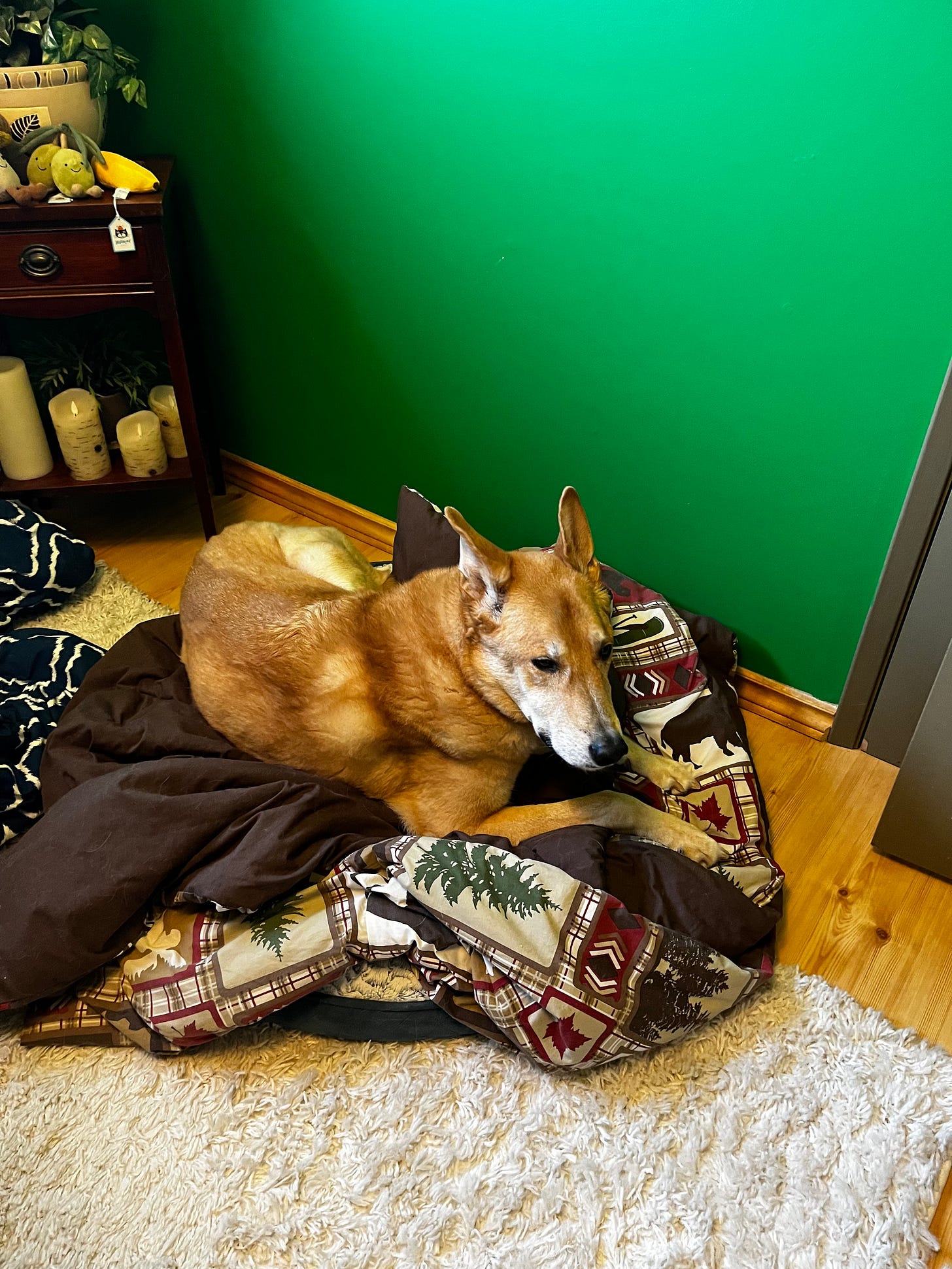What most freelancers get wrong about boundaries
Why you should set boundaries before you think you need them
A few Sundays ago, I was soaking up a quiet day with my dog. We were curled up on my bed, watching TV, just being together. Because he had been diagnosed with terminal cancer in February, I knew time was precious—though I didn’t yet know just how precious.
Listen to this article by pressing play below

Then, out of habit, I picked up my phone. One quick scroll through email, I told myself. What harm could it do?
And there it was: a message from a client asking for revisions. Nothing urgent. No big drama. Just a simple “Take a look at this article when you have a chance. We’ve left some notes for revisions. Let us know when you can get to them.”
Old Heidi—the freelancer I was 20 years ago (honestly, even 10 years ago)—would have jumped on it. I would’ve replied instantly with something like, “No problem, I’ll take care of that right now!” just to prove I was reliable and deserving of their business.
But this weekend, I didn’t. I closed my email, put down my phone, and got back to cuddling my pup and binge-watching low-stakes TV shows. Because this version of me knows I don’t owe anyone urgency.
The real point of boundaries
A lot of independent professionals think boundaries are about controlling our clients—stopping them from messaging us outside of hours or getting them to act a certain way. But that’s not what boundaries are for.
Boundaries are about our behaviour. Not theirs. Boundaries set expectations around how we will respond to certain situations.
You can’t stop a client from working weekends. You can’t prevent them from emailing you when something is on their mind (would you want to be told you couldn’t send an email when it was convenient to you?). But you can choose when and how you respond to those situations.
I didn’t email back that Sunday. I waited until Monday, responded during work hours, and gave a timeline for the revisions. No explanation. No apology.
I’m not here to be available 24/7. I’m not here to prove my worthiness. I’m here to do meaningful, high-quality work, and that starts with respecting my own capacity.
Respecting your capacity means having boundaries and honouring them.
Why boundaries matter (especially when you're struggling)
Boundaries aren’t just a productivity tool. They’re survival tools. They protect your energy, especially when you’re grieving, overwhelmed, or going through something heavy that the outside world can’t always see (and that you’re under no obligation to share).
When you’re a business owner, urgency can feel louder. Every request, even the small ones, can feel like a weight. And if you’re not careful, you’ll start performing urgency for other people while neglecting what you need to get through the day.
But here’s the thing:
You don’t need to answer emails the second they arrive to be reliable.
You don’t need to be constantly available to be professional.
You don’t need to explain your boundaries in order to enforce them.
You don’t need to give everything you have to prove you have value.
Your clients hired you because they trust your skills—not because you’re on-call 24/7. You're not an employee. You're not an assistant. You're a business owner. That means acting like a partner, not an order-taker.
Establish boundaries to foster mutual respect
A strong working relationship is built on mutual respect. That means respecting your clients' time and needs—and expecting them to respect yours in return. Boundaries reinforce that dynamic. They remind both parties that you’re running a business, not signing up to serve someone else’s every whim.
Mutual respect runs both ways, that’s the point of it. It doesn’t mean that their needs (real or assumed) automatically supersede yours.
When my client emailed me on that Sunday, I didn’t say, “Sorry I didn’t get back to you sooner, I don’t answer emails on weekends…” I just responded on Monday, during my working hours, with the information he needed. That was enough. That was all I owed him because taking personal time on the weekend doesn’t require permission. And a 24-hour response—especially over a weekend—is not only reasonable, it’s professional.
And guess what—when he got my email on Monday, his response was, “Great! Thanks for getting back to me so quickly and letting me know about the revisions.” Because that’s the reasonable response to this situation.
Start setting boundaries now
Sometimes, your life will feel too tender, too stretched, or too heavy for you to be everything to everyone. That’s when boundaries matter the most.
But here’s the thing most people miss: The time to set boundaries isn’t when you’re overwhelmed, it’s before. Because when you’re exhausted, grieving, or stretched too thin, you won’t have the energy to calmly draw lines in the sand. You’ll be more likely to snap, ghost, or break down trying to hold it all together (ask me how I know).
Boundaries are easiest to keep when they’re already part of how you run your business—not something you scramble to enforce only when things fall apart. If you wait until you’re overcapacity to suddenly create a boundary, it won’t feel like a boundary. It’ll feel like damage control. And your clients will be left stunned, wondering what’s changed with you.
That’s why setting boundaries when things are going well is such a gift to your future self. You get to communicate clearly, act consistently, and make space for the inevitable moments when life gets hard, without having to rewrite your policies mid-meltdown.
Boundaries aren’t just a reaction. They’re a practice. And when you build them early, they become a safety net instead of a scramble. They feel natural and comfortable, and everyone knows what to expect of you.
A quick guide to boundaries that stick
As freelancers, we often set boundaries in theory only; that is we have boundaries until the moment it feels uncomfortable to hold them. We don’t respond to emails on weekends as long as our clients don’t email us on weekends. But the first time they email us on a Saturday afternoon, we give in.
We assume that if someone emails us outside our set hours, they’re disrespecting our boundaries. They don’t care about our needs and now we’re obligated to toss our boundaries aside. But more often than not, they’re just working on their own schedule.
The boundary isn’t broken by their email. It’s broken when we decide to abandon what we said we’d do.
So how do you set boundaries that hold?
Know what you need. What hours do you want to work? What requests drain you? What do you need to protect and how can you protect it? Boundaries start by noticing what feels unsustainable.
Set policies around your needs. I feel too rushed and frantic if I have to respond to every email immediately. Likewise when others are in charge of my calendar. So I have policies around responding to emails (not outside of business hours) and taking meetings (no meetings before 10 am or after 3 pm Pacific, or on Fridays or weekends).
Communicate clearly. Let clients know what to expect, especially around timelines, response windows, and availability. Make this clear in your initial email to them, your letter of agreement, or your first meeting.
Hold the line—without apology or over-explanation.
When they do make a request of you that pushes a boundary, consider how to respond:
Instead of “I’ll get to this right away” → “I have availability on Wednesday and will make this the top priority then.”
Instead of responding to a late-Friday request with “I usually don’t work weekends, but…” → “I don’t have the capacity today but I’ll be back online Monday and can take a look then.”
Instead of “Hope it’s okay…” → “Just a heads-up: I only schedule meetings with 24 hours’ notice.”
Don’t apologize when you’ve done nothing wrong. Taking personal time on the weekend doesn’t need an apology. Missing a deadline because you forgot to communicate with your client that you needed some personal time during the week does deserve an apology.
Trust your clients to be adults. They can handle delayed responses, longer timelines than they would like, or hearing a clear no when needed. And often, you don’t even have to say anything—just hold your boundary and respond within the structure you’ve already set. If a client ever pushes back in a way that feels unreasonable or demanding, that says more about them than it does about you. It might be a sign to walk away.
Why these boundaries are so important
It may never have been more important for me to keep a boundary than it was that Sunday.
Though I didn’t know it at the time, it turned out to be my last weekend with my precious pup—I said goodbye to him that Wednesday—and I would have hated myself if even a second of it had been taken up with work. Instead, we spent the weekend cuddled up, watching TV, going for walks, and just being together. It was quiet and ordinary and absolutely perfect. It was exactly what we both needed for our last weekend together.
And I’m so grateful I didn’t trade a moment of it for a client email.
If you want to dig a little deeper into boundaries, try journalling on this:
What boundaries would I set in my business if I truly believed my time, energy, and well-being mattered just as much as my clients’ needs?
And if you’re not sure where to start, consider:
What situations in the past have left me feeling drained, resentful, or overextended?
What would it look like to respond to client requests from a place of confidence instead of urgency?
What boundary have I been hesitant to set—and what’s the story I’m telling myself about why I can’t set it?
You don’t need to solve everything today. Just spend a few minutes getting honest with yourself. Sometimes clarity starts with simply giving yourself permission to want things to be different.
Heidi
Want to get clearer on the boundaries that matter most to you?
The Freelancing Values Workbook is a free resource to help you define what matters in your business—so you can make confident decisions, set boundaries that feel right, and build a freelance life that works for you.
👉 Download the workbook here and start building your business on your terms.





Really great reminders Heidi! And I'm so sorry to hear about your dog.
Great article Heidi. It has taken me decades to put in boundaries and I'm still working hard to keep them. So sorry to hear about your dog, sending condolences.